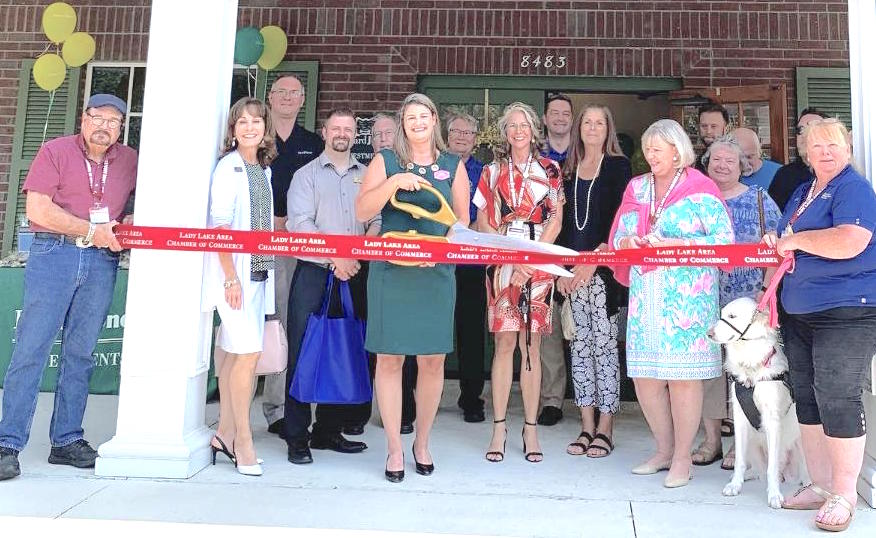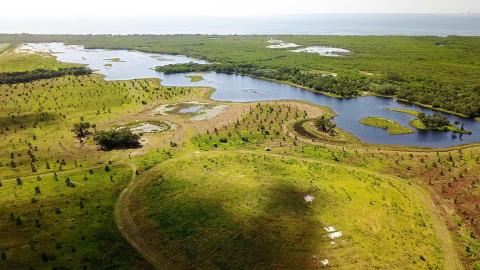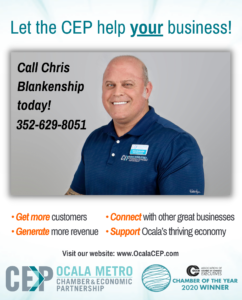THE VILLAGES, Fla. — Wednesday the 25th, Governor Ron DeSantis opened a new monoclonal antibody treatment site at The Villages. This treatment site will be open seven days a week from 9 a.m. to 5 p.m. and has the capacity to serve more than 300 patients per day.
The Villages monoclonal antibody treatment site is located at:
Barnstorm Theater2720 Brownwood Boulevard
The Villages, Florida 32163
Hours: 7 days a week, 9:00 a.m. – 5:00 p.m.
Information from the net and sharing by TomL
The Biden Administration is sanctioning a safe house’s for ILLEGAL’s in the USA, probably many!
ILLEGAL SAFE HOUSE is in the former Homewood Suites in Scottsdale, Arizona.
The Hotel is on lock down and is guarded by LES Officers, LES is Law Enforcement Services hired for the job along with some ICE agent’s. It has a cloak of mystery over and around it. No one is permitted to answer question but several good reporters got a few answers. It is interesting that they would pick a entire hotel and hire a food service to come in to feed them. Guess whom is paying for it. Some say it is a strategy to increase the population in curtain states and curtain voting districts to increase the amount of representative that are aloud. Shifting people and moving boundary’s on voting blocks have been going on for years. In fact it has been done here locally.
The way this was found out was by a tip that was given to a reporter, the right reporter who followed up and printed the truth. I thought it worth sharing because of the seriousness of the matter. THE VOTING BLOCKS! Continue reading
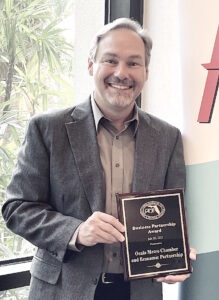 Ocala, Florida (August 3rd, 2021) –The Florida Association for Career and Technical Education awarded Dean Blinkhorn, Vice President of Operations and former Director of Talent Development at the Ocala Metro Chamber of Economic Partnership, the Walter Clausen Award. Blinkhorn accepted the award at the Association for Career and Technical Education Conference in Orlando on Tuesday morning.
Ocala, Florida (August 3rd, 2021) –The Florida Association for Career and Technical Education awarded Dean Blinkhorn, Vice President of Operations and former Director of Talent Development at the Ocala Metro Chamber of Economic Partnership, the Walter Clausen Award. Blinkhorn accepted the award at the Association for Career and Technical Education Conference in Orlando on Tuesday morning.
“Dean’s work has been integral in connecting our local business and industry with CTE students,” states Kathy Otte, Career and Technical Education Program Specialist at Marion County Public Schools. “He started several initiatives to benefit our students, such as NEXTworking and Hire a Graduate that have helped our students determine a career path. His support has enabled a multitude of opportunities for our CTE students.”
“I humbly accept this award as a recognition of the extraordinary work the Ocala Metro CEP has been able to achieve in CTE education through the continued efforts of many hard-working classroom teachers, district CTE staff, and industry partners in the community,” Blinkhorn says. “I’m looking forward to being part of the local CTE conversation for many more years to come.” Continue reading

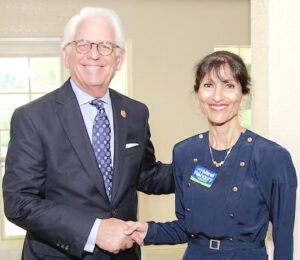 Pictured are the two candidates. Mayor Quinn on left and Manual Fakhoury right. They both spoke at the Ocala Business Leaders Family breakfast meeting August 11th. They both stood on their past records.
Pictured are the two candidates. Mayor Quinn on left and Manual Fakhoury right. They both spoke at the Ocala Business Leaders Family breakfast meeting August 11th. They both stood on their past records.
Incumbent Mayor Kent Quinn spoke standing on his record. He as he called it, when speaking he wings it! But as he was winging it a lot of good information came out. One of the big things is voting against a Pavilion for the Homeless. Quinn said the Homeless are in two category. Those who want to be homeless. A lot of crime comes from this group. Also their is a group that don’t want to be there. They want to get a job and work their way out of the homeless situation. Quinn also share some long range plans. He reported that he and Chief Balken had discuss the policing needs of the city and they propose it to City Council, it is up to them to vote for the finance needs. Quinn is also on the State Board of Directors for the past 19 years of the CHS which is the Children’s Home Society, it’s over a hundred years old and is the largest private not for profit child welfare agency in the state of Florida. Continue reading
July 27, 2021
During the District’s 60-year history, new laws established through the decades have helped the District protect water quality and natural systems. Here’s a look at some of the key legislation and programs established:
Save Our Rivers: The program, established in 1981, allowed the District to acquire lands for the purposes of water management, supply and protection. The first major land acquisition using Save Our Rivers funding was the Green Swamp West property. The protection of this corridor has
been vital because of the land’s ability to slow the flow of floodwaters, sustain rivers and streams, and store surface water.
Water Quality Assurance Act: The passing of this act in 1983 gave water management districts additional responsibilities including plugging all known abandoned artesian wells. This new District responsibility had a major impact on the state’s water quality because these abandoned wells were often a source of water contamination by allowing poor quality water from lower aquifers to invade drinking water of the Upper Floridan aquifer. The plugging of these wells led to cleaner drinking water for District residents.
Wetlands Protection Act: This 1984 legislation formally recognized the value wetlands have in protecting water quality and preserving the state’s natural habitat. As a result of the act, District staff began to regulate activities that impact the wetlands, which eventually led to the development of the District’s current Environmental Resource Permitting program.
SWIM Act: In 1987, the Florida Legislature passed the Surface Water Improvement and Management (SWIM) Act to protect, restore and maintain
Florida’s highly threatened surface water bodies. The District’s SWIM program evaluates priority water bodies, identifies potential problems and implements projects to improve their water quality or habitat. Since the program’s start, 375 water quality and natural systems restoration projects have been completed or are ongoing.
Clean Waterways Act: This 2020 legislation gives state agencies authority to address water quality and water supply issues affecting Florida’s waterbodies. This legislation included additional regulation of septic tanks as a source of nutrients, updated stormwater rules and increased exploration of potable reuse as an alternative water supply.
Photo credits: Southwest Florida Water Management District. See more
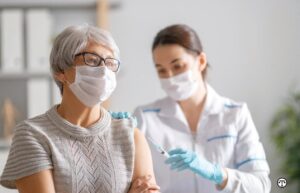 (NAPSI)—With the three new COVID-19 vaccines widely available, millions of Americans have been encouraged to get vaccinated. The Centers for Disease Control and Prevention (CDC) reports that, as of July 2021, 47% of the total U.S. population is now fully vaccinated and over 182 million Americans have received at least one dose. This effort has helped reduce the number of COVID-19 cases and deaths.
(NAPSI)—With the three new COVID-19 vaccines widely available, millions of Americans have been encouraged to get vaccinated. The Centers for Disease Control and Prevention (CDC) reports that, as of July 2021, 47% of the total U.S. population is now fully vaccinated and over 182 million Americans have received at least one dose. This effort has helped reduce the number of COVID-19 cases and deaths.
But people with diabetes may have questions about COVID-19 vaccines, including whether they should get vaccinated and whether the vaccines are safe. If you have diabetes, here is what you need to know:
•People with diabetes should get vaccinated. About 40% of people who died from COVID-19 from February to April 2020—before COVID-19 vaccines were publicly available—had diabetes. People with type 1 or type 2 diabetes often have complications including heart disease and obesity, which means people with either type of diabetes are at a much higher risk of developing severe illness if they were to get COVID-19. One of the best ways to avoid becoming seriously sick with COVID-19 is to get vaccinated.
•The three COVID-19 vaccines are safe for people with diabetes. The available vaccines are not made from SARS-COV-2, the coronavirus that causes COVID-19, so there is no risk of getting sick with COVID-19 just from getting the vaccine. People with diabetes were included in COVID-19 vaccine clinical trials across the United States and other countries, and none of the trials reported significant safety issues among study participants.
•Continue monitoring your blood glucose regularly after being vaccinated. In some individuals, the vaccine may cause possible side effects that can be similar to feeling sick, such as chills, fever, and nausea. People with diabetes should speak with their health care professional about this and how to monitor their blood glucose levels following COVID-19 vaccination. Continue reading
 (NAPSI)—In these uncertain times, kids need music more than ever. Anyone who has ever seen toddlers naturally sway and bob to music, knows that children feel music—and that music and kids go together like macaroni and cheese. Studies also show that music can help the very young deal with stress and turn around their emotions like nothing else.
(NAPSI)—In these uncertain times, kids need music more than ever. Anyone who has ever seen toddlers naturally sway and bob to music, knows that children feel music—and that music and kids go together like macaroni and cheese. Studies also show that music can help the very young deal with stress and turn around their emotions like nothing else.
Tunes For Toddlers
To that end, Walt Disney Records’ most successful lullaby album artist and producer, Grammy nominee Fred Mollin, created “It’s Great To Be a Kid,” a new album of heartwarming, fun original songs for kids ages 1 through 6. These songs take children on a musical expedition highlighting the beautiful things in life, reminding them how much joy there is to look forward to in their young lives at a time when they need it most.
The songs evoke the simple pleasures of being young, driving in a car, walking and seeing the beauty of nature, playing with friends, dancing to an upbeat song, the joy of food and even the fun of helping tidy up the house. Three interactive Bonus Tracks are versions that leave key moments blank during the songs, for children to join in.
Learn More
For further information, visit www.melodyplacemusic.com and www.fredmollin.com.
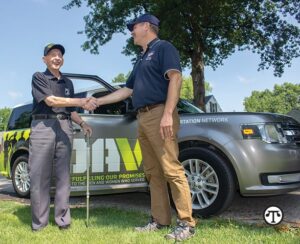 (NAPSI)—There are certain aspects of the COVID-19 pandemic that many Americans may not have thought about. For example, one area that saw a sharp decline was volunteerism—placing heavy burdens on nonprofit organizations that rely on the compassion of their volunteer forces.
(NAPSI)—There are certain aspects of the COVID-19 pandemic that many Americans may not have thought about. For example, one area that saw a sharp decline was volunteerism—placing heavy burdens on nonprofit organizations that rely on the compassion of their volunteer forces.
According to a recent research survey by Fidelity Charitable, a nonprofit organization created by Fidelity Investments, two-thirds of all U.S. volunteers had either decreased volunteer hours or stopped volunteering altogether because of the pandemic.
Volunteer to Help Veterans
One nonprofit feeling the effects is DAV (Disabled American Veterans) and its Transportation Network, which has helped get veterans to and from medical appointments since 1987, when the government-run system was shut down. The nationwide DAV Transportation Network provides no-cost rides to veterans who need help getting to their Department of Veterans Affairs (VA) medical centers and clinics. Prior to 2020, volunteer drivers spent more than one million hours and logged over 20 million miles, providing more than 600,000 rides for veterans each year.
“We’ve seen a major decline over the past year in volunteer support across all of our programs,” said John Kleindienst, Director of Voluntary Services at DAV. “For our aging veteran population, getting to and from critical care appointments is a growing concern and without volunteers, many veterans have no way to access their health care or get other much needed support.” Continue reading
 (NAPSI)—While most American adults have already received at least one dose of a COVID-19 vaccine, a lot of people still have questions. Everyone deserves to have access to factual information to make a decision about getting vaccinated. But many people don’t know where to go to get their questions answered.
(NAPSI)—While most American adults have already received at least one dose of a COVID-19 vaccine, a lot of people still have questions. Everyone deserves to have access to factual information to make a decision about getting vaccinated. But many people don’t know where to go to get their questions answered.
For most people who want more information, talking to their personal doctor is the best place to start. Your doctor or health team will know you and your medical situation better than anyone. They can help you make an informed decision that’s right for you.
When talking with your doctor, there are a few key questions you may want to consider:
Vaccine Questions:
1.Why did your doctor choose to get vaccinated? Over 90% of doctors have decided to get vaccinated against COVID-19. You may want to hear more about why they chose to get vaccinated as a healthcare provider. Continue reading
